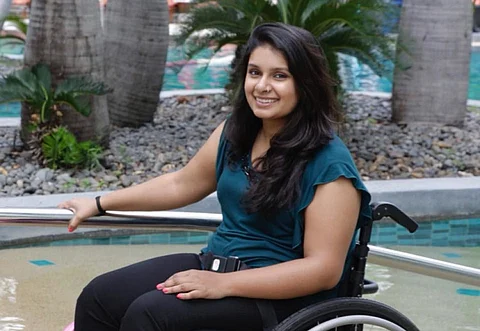

A petition to make the Indian Railways disabled friendly has gained a lot of traction, and has even caught the attention of Railways Minister Suresh Prabhu.
Virali Modi, the woman who started the petition, is a disability rights activist, campaigner and public speaker. She sits in her wheelchair without awkwardness, exudes confidence and smiles easily.
However, this wasn’t always her temperament.
Virali was living the US in 2006, when she contacted malaria. Subsequent complications led her to slip into a coma. She was even declared dead thrice in 23 days. She went into cardiac and respiratory arrest, and her body temperature dropped to below 90 degrees Fahrenheit. She also lost a lot of blood which made her haemoglobin drop to dangerously low levels.
The odds were stacked against her, but she opened her eyes again on September 29, which also happened to be her birthday.
“It was like being born again,” she tells TNM.
And while Virali was happy to be alive, there was a catch – she was paralysed from the waist down. It plunged her into months of depression, and she even attempted to take her life.
When she moved from the US to India in 2008 to get access to better treatment for neurological issues, though, it started a whole new chapter in her life.
As a wheelchair-bound woman in India, she realised how difficult it was to do something as simple as taking a train. After being groped and molested by porters while boarding a train and facing other difficulties while on board, Virali decided to do something to make rail transport more accessible.
Now, the 27-year-old’s petition on change.org to make the Indian Railways disabled-friendly now has over 2,21,000 signatures.
Not only did Suresh Prabhu respond saying they would make train stations “divyang friendly”, but the Chennai, Ernakulam, Kochi and Thrissur stations also responded to her petition and introduced disabled-friendly infrastructure.
“They’ve made the lounges and washrooms wheelchair-accessible. They’ve also added portable ramps and small aisle-sized wheelchairs. Recently, in Odisha and Hyderabad, one train each have been made disabled-friendly,” Virali shares excitedly.
Highs and lows of activism
On Wednesday, she visited Bengaluru and had a session with students of Department of Sociology at Christ University, facilitated by change.org. She shared that a few years ago, she could not even imagine being a disability rights activist.
After sharing her story with them, Virali spoke to TNM about her takeaways from activism in India and the highs and lows of the experience.
“The lowest point for me was being slut-shamed after I came out with my story on change.org. I got a couple of messages on my Facebook where people said things like ‘wasn’t being molested enough for you? You have to publicly talk to the government about it?’ That was very disappointing,” she shares.
However, all her struggles appeared to be worth it when the Chennai Railway Station got revamped. “I wasn’t there but I saw photos. The smile on the faces of other disabled persons as they were able to get onto the platform and into the train without feeling inadequate was worth everything,” she says with a wide smile.
Though she acknowledges the small changes that are happening in pockets, Virali believes that disability activism still has a long way to go in India.
“There is very little visibility and awareness about disability. If you ask a random person if they know what accessibility is, see their response. They are clueless,” she observes.
Going beyond tokenism
Virali also acknowledges that there is a lot of tokenism when it comes to marginalized communities, including women, disability, and even disabled women.
“It's hypocritical. People celebrate World Disability Day but even today, disabled children are isolated and made fun of in schools. How do you expect a child who’s on a wheelchair or has a learning disability to go to school then? Teachers and parents need to acknowledge disability in a positive way… Otherwise what’s the point of celebrating a World Disability Day,” she argues.
“Then there’s all this terminology – ‘divyang’, ‘differently-abled’… I don’t really get it. It’s like sugar-coating the disability. And it's another form of tokenism – that we are going to call you in a different way, to distract you from how marginalized you are,” Virali says.
Acknowledging that women who are disabled are even more marginalised, she says, "Every day should be about women and disability."
Self-love and humanising disability
When a member of the audience asked Virali who motivated her – apart from her family – through tough times, she had a surprising answer – Bollywood actor Bipasha Basu. “She’s dark-skinned, she gets a lot of hate, but she always advocates self-love. That’s so important. I had to learn to love myself, and now that I do, I can say that this wheelchair is my throne, and I am the queen. And no one has the right to tell me otherwise,” Virali says.
She acknowledges to TNM, however, that not every disabled person has the privilege of education, access to healthcare and a supportive family. “But I believe that once we learn to see ourselves as human, it’s the first step to not letting disability define us, and ultimately, not letting others define us by our disability.”
Virali has now petitioned the National Restaurants Association of India to make restaurants wheelchair-friendly. Access her petition here.